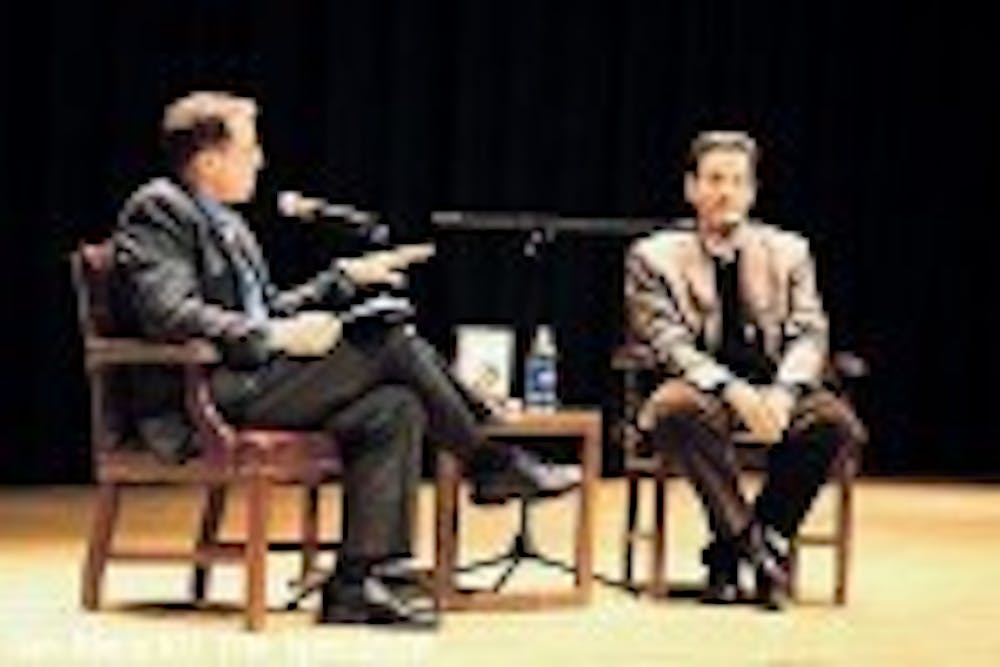The story of Jesse Owens and his part in the 1936 Olympic Games, better known as "Hitler's Olympics," is a complicated one, whose truth may be long lost in the annals of history and record books.
Few know of Owens' friendship with rival German long-jumper Luz Long, or Long's advice that helped Owens beat him for the Gold Medal. There has been much debate over Hitler's "snub" and the political back-story to a boycott that, had it taken place, might have stopped Owens' record-setting four-gold-medal Olympic performance before it began.
On Tuesday night, Jeremy Schaap, author of the newly-released book "Triumph: The Untold Story of Jesse Owens and Hitler's Olympics", joined host Bert Gambini in the Student Union Theatre as part of WBFO's "Meet the Author" series to help make sense of a legend that's often misremembered.
Although Owens' name has lived on far longer than its namesake, for much of the last 70 years, the only recollection of the athletic star's monumental feat in the Eleventh Olympiad has been in the Track and Field record books and in the whispers of fans who still remember the heyday of the once-glamorous sport.
A diverse crowd of students, alumni and fans gathered eagerly to hear the author's take on one of the most infamous competitors in the history of the Olympic Games.
"They know the name," Schaap said. "They know that they should know what he did, but nobody really does. And in fact, most of what people know turns out to be wrong - turns out to be very wrong in some cases."
The night began with Schaap reading from the book's prologue, which detailed a night in 1955 when Owens and his family were interviewed over satellite by Edward R. Murrow on the legendary journalist's weekly show Person to Person.
Schaap flowed from sentence to sentence with an intelligent and vivid prose that has become his trademark as an ESPN correspondent and anchor on the daily television show Outside the Lines.
The audience became privy to Schaap's stories that detailed the weeks leading up to and including Owens' record-setting Olympic performance. With each tale, Schaap brought light to a new layer in a story fraught with depth.
"The story, it's so layered, there are so many nuances to it," Schaap said. "It's a political story, it's a social story, it's an athletic story, it's a racial story. That's what appealed to me - that there were so many different layers, so many different ways to approach it and look at it. So for me it was a sports story that could also be situated in a bigger political and social framework."
With a story as complicated as the legendary Olympian's, Schaap's greatest difficulty became separating fact from a legend that has grown since inception.
The mystery proved to be determining whether Owens campaigned to be on the 4x100 meter relay team at the expense of two Jewish teammates. The American victory gave Owens his fourth and record-setting gold medal.
However, the Ohio State graduate was not expected to compete in the relay having already won three gold medals, but his last-minute decision to join the team forced two Jewish team members out, an act often seen as a foolish attempt to appease the Nazi hosts.
"That's the thing in the book that hasn't really been written about," Schaap said. "He certainly wanted to stick it to the Germans one more time, but when you've got eight people in a room and they've all got a different version of what happened, you kind of have to sift through and present all the different sides and find a way to present that coherently and intelligently. That to me was what was most difficult: separating myth from what was probably truth."
The nuances of the story drew many to the event, including host Gambini, who said he was very excited to have Schaap as a guest in the series.
"The story of Jesse Owens is remarkable," Gambini said. "It's one that's really deserving of wider recognition and one that has to be told, or really should be told in the detail that Jeremy addresses in the book."
Amy Gavazzi, a graduate student in the School of Counseling, said that she enjoyed the way Schaap was able to meld the different layers into one succinct story.
"I really liked it," Gavazzi said. "I kind of liked how he brought in real history and then sports. I think it's an interesting mix."





